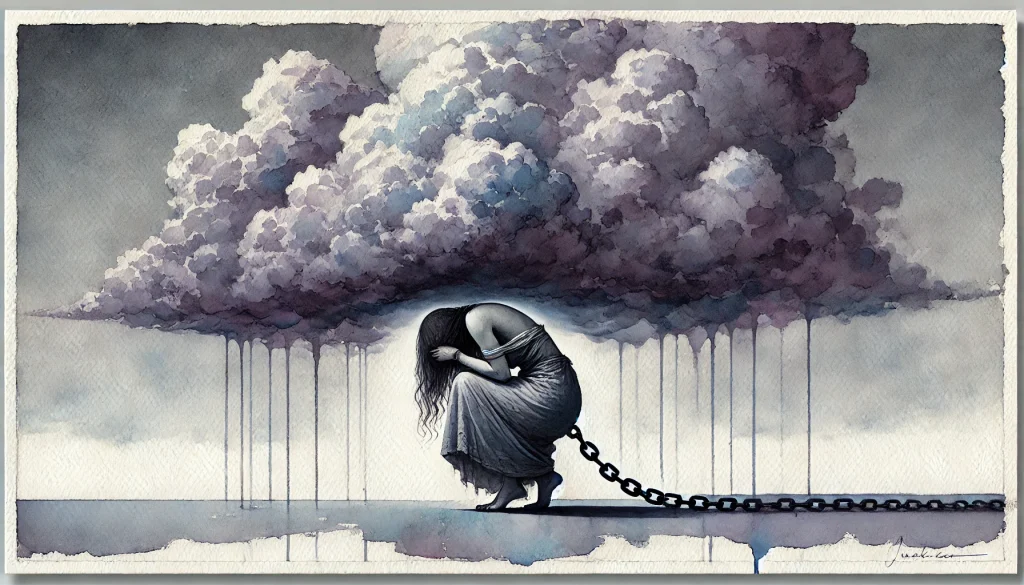
Depression is often seen as just persistent sadness or a prolonged feeling of being down. However, it’s much more complex than that. There’s an undercurrent to depression that isn’t always visible on the surface, and one of these hidden elements is toxic shame. This isn’t the kind of shame you feel when you forget to return a friend’s call or miss a meeting. Toxic shame is deeply ingrained and can be a driving force behind depression.
Imagine a child who is constantly told they are not good enough, not smart enough, or not lovable. Over time, these messages don’t just stay as words; they become internalised and turn into a core belief that the child carries into adulthood. This belief—”I am inherently flawed”—is what we call toxic shame. It’s a persistent sense that there’s something fundamentally wrong with who you are. This kind of shame can be paralysing. It’s not about feeling bad for doing something wrong; it’s about feeling bad for being who you are.
Toxic shame is like a dark cloud that hangs over everything. It can prevent people from experiencing joy, building healthy relationships, and pursuing their dreams. This deep shame can cause depression because it damages self-esteem and makes a person feel constantly inadequate. When someone always feels unworthy or flawed, they can easily fall into hopelessness and despair.
Sarah grew up in a family where she never felt good enough. Her parents constantly criticised her and never praised her achievements. Now as an adult, even though she has a good job and a caring partner, Sarah still feels like she isn’t worthy. She often thinks she’s a fraud. This deep-seated feeling of shame has caused her to become depressed. She feels very tired, lacks motivation, and feels cut off from everything around her.
When people experience depression, they are often prescribed antidepressants. These medications can help to balance chemicals in the brain, such as serotonin, which can improve mood. For some, antidepressants can be lifesaving, providing the necessary relief to get through the day. However, they are not a cure-all. Antidepressants primarily address the symptoms of depression, not the underlying causes.
Imagine you have a leaking roof, and you place buckets to catch the water. The buckets prevent your floor from getting wet, but they don’t fix the roof. Antidepressants are like those buckets. They can help manage the symptoms, but they don’t address the root cause of the problem—whether it’s toxic shame, trauma, or other deep-seated issues. Many people find that despite taking medication, their depression persists or returns once they stop. This is because the core issues, such as toxic shame, remain unresolved.
For instance, Sarah might benefit from therapy where she can explore her feelings of worthlessness and understand their origins. By working with a therapist, she can begin to challenge and change the negative beliefs about herself that have been ingrained since childhood. Over time, she can learn to see herself in a new light and build a more positive self-image. This process can be difficult and may take time, but addressing these core issues is crucial for long-term healing.
In addition to therapy, other practices such as mindfulness, self-compassion exercises, and building supportive relationships can help people overcome toxic shame. These practices encourage self-awareness and self-acceptance, which are essential in breaking free from the cycle of shame and depression.
Understanding that depression goes beyond just feeling sad and often involves deeper issues like toxic shame can change how we treat it. Antidepressants can help with symptoms, but they don’t address the root causes. By focusing on these underlying issues, we can achieve true healing and a better life. Understanding the hidden parts of depression and the impact of toxic shame can help people feel less alone and see that recovery is possible. It’s essential to approach depression with kindness and be open to looking deeper, as real healing often means dealing with underlying issues.
If you or someone you love is struggling with depression, you don’t have to go through it alone. At My Practice Counselling Melbourne, Jonathan Riley and our team are here to help. Reach out today to start your journey toward a healthier, happier life. Contact us now to book an appointment.